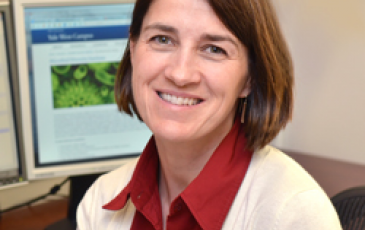Nancy Keller's research focus lies in genetically dissecting those aspects of Aspergillus spp. that render them potent pathogens and superb natural product machines. We are interested in elucidating the mechanism of fungal sporulation and host/pathogen interactions; processes intimately linked to secondary metabolite (e.g. mycotoxin) production.
Past PMB Endowed Lectures
For a schedule of all Plant & Microbial Biology events, seminars, and lectures visit our calendar.
Toshiharu Hase: Arnon Lecture: Ferredoxin - protein interactions and energy transduction in Photosynthesis
Dr. Hase is Professor Emeritus of Osaka University and formerly affiliated to the Institute of Protein Research at Osaka University. His research interests include photosynthetic electron transfer, ferredoxin-dependent redox metabolisms and the structure/function of redox enzymes.
Christine Jacobs Wagner: Kustu Lecture: What makes the Lyme disease bacterium tick?
Christine Jacobs Wagner. Our laboratory is part of the Microbial Sciences Institute at the Yale West Campus. Our group studies the temporal and spatial mechanisms involved in bacterial physiology, with emphasis on chromosome dynamics, cell division, cell cycle regulation, cell morphogenesis and RNA biology. Our primary model organisms are Caulobacter crescentus, Escherichia coli and the Lyme disease pathogen Borrelia...
Maria Harrison: Tsujimoto Lecture: Reprogramming root cells for AM symbiosis
Maria Harrison. Most vascular flowering plants are able to form symbiotic associations with arbuscular mycorrhizal (AM) fungi. These associations, named ‘arbuscular mycorrhizas’, develop in the roots, where the fungus colonizes the cortex to access carbon supplied by the plant. The fungal contribution to the symbiosis includes the transfer of mineral nutrients, particularly phosphorus, from the soil to the...
Benjamin Wolfe: Plant and Microbial Biology Tsujimoto Endowed Lecture: "Delicious rot: using fermented foods to dissect microbiome diversity"
Benjamin Wolfe. The Wolfe Lab uses tractable microbial communities from food systems to study the ecological and evolutionary forces that shape microbial diversity. They also use food as a tool for improving microbial literacy through teaching and outreach.
Jing-Ke Weng: Buchanan Lecture: Mechanistic Basis of Metabolic Evolution in Plants
Jing-Ke Weng has broad interests in understanding the origin and evolution of plant specialized metabolism at enzyme, pathway, and systems levels, as well as how plants exploit discrete small molecules to interact with their surrounding biotic and abiotic environments. Their work in plant metabolic evolution impacts a fundamental question in biology – how do complex traits evolve in a Darwinian...
David Hibbett: Taylor-White Lecture: Getting to the Roots of Rot: Fungal Phylogenomics and the ‘End of the Carboniferous Period
David Hibbett “Getting to the Roots of Rot: Fungal Phylogenomics and the ‘End of the Carboniferous Period’”
Carol Gross: Kustu Lecture: Manufacture of the bacterial proteome
Carol Gross. Manufacture of the bacterial proteome
Rusty Rodriguez: Tsujimoto Lecture: Reprograming Plants for Stress Tolerance and Improved Nutrition through Symbiogenics
Rusty Rodriguez. Reprograming Plants for Stress Tolerance and Improved Nutrition through Symbiogenics
Sam Hazen: Buchanan Lecture: Daily Rhythms and the Transcriptional Regulation of Plant Biomass Accumulation
Sam Hazen. Daily Rhythms and the Transcriptional Regulation of Plant Biomass Accumulation











